
The US Air Force’s Office of Energy Assurance (OEA) recently issued an open request for information (RFI) that seeks industry guidance in collecting technical and financial data – as well as examples of innovative projects – in the area of energy resilience. The Air Force intends to use the information to eventually develop projects which optimize demand and assure energy supply.
The RFI asks for specific input on:
- available concepts/potential resilient energy solutions and their advantages and disadvantages;
- the benefits and risks associated with each of the energy resilience, financing, development, ownership, and operations and maintenance concepts identified;
- regulatory, policy, and market restrictions and drivers by project location;
- estimated range of costs for each concept in light of risk versus life-cycle cost balance; and
- any challenges that the solutions or concepts may have in meeting OEA’s mission requirements.
Under the goals set out in the 2017-2030 energy plan, the Air Force intends to eliminate 20 percent of the single points of energy failure within its critical infrastructure by the year 2025. By 2020, it wants be using energy resilience technologies – such as cybersecure microgrids – for critical infrastructure and by 2036 have a reliable energy supply for all mission critical functions at all times.
The plan finds that using advanced smart meters and microgrids can “improve energy management, flexibility, security, and reliability.” The Air Force is particularly concerned about cybersecurity, noting that military installations “are largely dependent on the national electric grid” and that “emerging and established threats increase the risks of prolonged, widespread disruptions to energy access.”
Responses are due by February 15, 2019. For more information, see FedBizOpps,
Solicitation Number: W912DY-18-U-OEA1.
